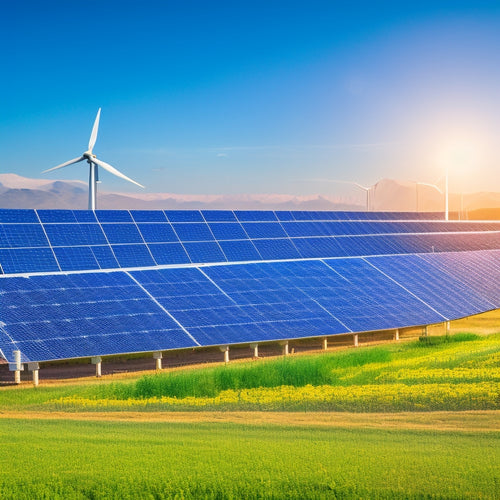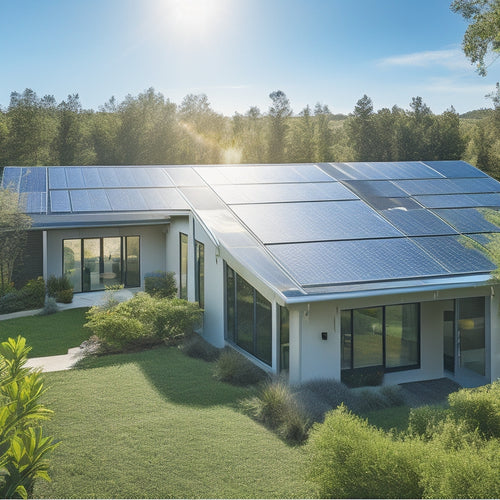
Rv Solar Power System
Share
You're about to release the freedom to roam wherever you please, untethered from the grid, with a self-sustaining RV solar power system that converts abundant sunlight into reliable energy. This off-grid solution eliminates dependence on traditional energy sources, allowing you to travel to remote areas without worrying about power outlets. With silent, clean energy generation at night, you can camp in secluded locations or boondock freely. To get started, you'll need to assess your energy needs, considering daily power requirements for your RV appliances and systems. By understanding your energy demands, you'll be one step closer to utilizing the full potential of solar power.
The Essentials
- RV solar power systems provide energy autonomy, allowing travel without power outlet concerns and exploration of remote areas.
- Solar power reduces reliance on fossil fuels, lowering carbon footprints and contributing to sustainable living and environmental protection.
- Accurate assessments of daily energy usage are essential to determine solar power needs and ensure adequate energy supply for comfort.
- Lithium-ion batteries offer higher energy density, improved performance, and significant weight reduction, making them ideal for RV solar power systems.
- Proper planning and understanding of energy demands are crucial for designing an effective solar power system for RVs.
Off-Grid Freedom Awaits You
You're about to experience the thrill of untethered escapade, as your RV solar power system liberates you from the constraints of grid ties.
By embracing renewable energy, you'll enjoy the freedom to roam wherever the road takes you, without worrying about finding a power outlet.
With a well-designed off-grid system, you'll be able to utilize the sun's energy and convert it into the power you need to stay connected and comfortable on the go.
Embracing Renewable Energy
As the world shifts its focus towards sustainability, embracing renewable energy has become an appealing option for many RV enthusiasts, allowing them to break free from the constraints of traditional power sources.
By incorporating solar power into your RV, you'll experience the numerous solar benefits that come with sustainable living. You'll reduce your reliance on fossil fuels, decreasing your carbon footprint and minimizing your impact on the environment.
With solar energy, you'll also enjoy lower operating costs, as you'll no longer be dependent on expensive fuel or utility bills. Additionally, solar power systems are relatively low maintenance, providing you with a reliable source of energy without the hassle of frequent repairs or replacements.
As you adapt to off-grid camping, a Camper Solar Panel Kit can be a revolutionary solution, allowing you to generate energy on the go and keep your devices charged.
By embracing renewable energy, you'll be taking a significant step towards achieving off-grid freedom, allowing you to investigate the great outdoors without being tethered to a power outlet.
With the right solar power system, you'll be able to live life on your own terms, untethered and unencumbered.
Freedom From Grid Ties
One of the most significant advantages of an RV solar power system is the freedom it grants from grid ties.
You'll no longer be bound to traditional energy sources, allowing you to traverse remote areas without worrying about finding a power hookup.
With a solar power system, you'll enjoy solar independence, relying solely on the sun's energy to power your RV's electrical systems.
By switching to a renewable energy source, you'll also reduce your carbon footprint concerns RV solar energy and minimize your overall energy expenses.
This energy autonomy gives you the flexibility to camp in secluded areas, boondock, or travel to areas with limited grid access.
You won't have to worry about the noise and pollution associated with generators, making your camping experience more peaceful and environmentally friendly.
Your RV solar power system will provide a quiet, clean, and reliable source of energy, giving you the freedom to roam wherever you please.
Silent Energy at Night
You're likely familiar with the noise and disruption caused by traditional generators, which can be a major drawback to enjoying the peace and quiet of the great outdoors.
With an off-grid RV solar power system, such as those offered by Renogy, you can utilize the power of the sun and store it in a deep cycle battery for later use off-grid solar battery.
A solar power system, on the other hand, provides a silent energy solution that won't disturb your camping experience.
Noisy Generator Alternative
How often have you found yourself sacrificing a peaceful night's sleep due to the constant hum of a generator in the background? The noise can be distracting, disrupting your well-deserved rest after a long day of discovering.
Fortunately, there's a solution that can provide you with the freedom to enjoy your RV escapades without the noise pollution.
A solar generator offers a clean energy alternative to traditional generators. By utilizing the power of the sun, you can recharge your batteries silently and efficiently. This means you can enjoy a quiet night's sleep, undisturbed by the constant hum of a generator.
Solar generators are designed to provide a reliable source of power, allowing you to charge your devices, lights, and appliances without the need for fossil fuels. With a solar generator, you can experience the freedom to camp wherever you want, whenever you want, without disturbing the peaceful surroundings.
Quiet Camping Experience
Camping at night is about embracing the serenity of nature, and a noisy generator can be a significant distraction.
As you seek to escape the hustle and bustle of daily life, the last thing you want is to disturb the peaceful atmosphere with a loud, rumbling engine.
That's why an RV solar power system is the perfect solution for a quiet camping experience.
High-Efficiency Charge Controller
When designing your RV solar power system, you need a high-efficiency charge controller that optimizes energy harvesting from your solar panels, especially when considering off-grid cabin kits that require reliable power supply.
This is particularly important for remote homes that rely on renewable energy systems. This advanced component guarantees that your system captures the maximum amount of energy available, converting it into usable power for your RV's batteries.
With efficient energy harvesting and advanced power regulation, you can rely on a steady supply of power, even during periods of low sunlight.
Efficient Energy Harvesting
Frequently, RV owners who invest in solar power systems overlook an essential component: the charge controller. This device plays a critical role in maximizing your solar panel efficiency and energy conversion rates.
A high-efficiency charge controller guarantees that your solar panels operate at their peak voltage, thereby increasing energy production. You'll want to look for a controller with a high efficiency rating, typically above 98%, to minimize energy losses during conversion.
Additionally, consider a controller with multiple charging stages, such as bulk, absorption, and float, to enhance the charging process. By utilizing the full potential of your solar panels, you'll be able to recharge your batteries faster and enjoy more freedom on the road.
With an efficient charge controller, you'll be able to boondock longer, exploring the great outdoors without worrying about running out of power. By prioritizing efficient energy collection, you'll get the most out of your RV solar power system and enjoy a more sustainable, off-grid lifestyle.
Advanced Power Regulation
By optimizing your solar panel's energy production, you've set the stage for efficient energy harvesting.
Now, it's time to take it to the next level with advanced power regulation. This is where a high-efficiency charge controller comes in, ensuring that the energy generated is stored safely and efficiently in your batteries.
With a sophisticated power management system, you can monitor and control the flow of energy to your batteries, preventing overcharging or undercharging.
This not only prolongs the lifespan of your batteries but also optimizes your system's overall performance.
Advanced power regulation also allows you to adjust charging parameters to suit your specific needs, giving you greater control over your energy storage.
Assess Your Energy Demands
You need to calculate your daily energy usage to determine how much power your RV solar power system must provide.
To do this, you'll want to identify the total power requirements of all your appliances, lights, and devices, taking into account their individual wattage and usage hours.
When it comes to off-grid RV solar systems, it's crucial to evaluate the energy efficiency of your appliances and lights, as well as the capacity of your RV batteries.
Daily Energy Usage
To accurately design an RV solar power system, evaluating your daily energy demands is crucial. You need to determine how much energy you consume on a daily basis to guarantee your system can meet your needs.
Start by tracking your energy consumption over a week or two to get an accurate representation. Monitor your power usage by noting the wattage and duration of each device, including lights, refrigerators, laptops, and appliances.
You can use power monitoring devices like smart plugs or a Kill A Watt meter to measure the energy consumption of each device. Make a list of all your devices, their wattage, and how many hours they're used daily.
Calculate your total daily energy consumption in watt-hours (Wh). Consider your energy usage patterns, such as whether you use more energy during the day or night.
This information will help you design a solar power system that can efficiently meet your daily energy demands, giving you the freedom to enjoy your RV excursions without worrying about running out of power.
Total Power Requirements
Accurately evaluating your total power requirements is a critical step in designing an efficient RV solar power system, as it enables you to determine the required solar panel size, battery capacity, and charging capabilities.
To calculate your total power requirements, you need to assess your daily energy usage, which includes the power consumption of all your appliances, lights, and gadgets. Make a list of all the devices you plan to use in your RV, along with their wattage ratings and the number of hours you expect to use them per day. This will give you a total daily power consumption in watt-hours (Wh).
Next, evaluate your energy efficiency goals. Are you looking to reduce your energy consumption to minimize your reliance on fossil fuels? Or do you want to maintain a comfortable level of power usage without sacrificing convenience?
Lightweight Lithium-Ion Batteries
When selecting a battery for your RV solar power system, you'll want to take into account the weight advantage of lithium-ion batteries.
These batteries typically weigh between 20-40 pounds, which is considerably less than traditional lead-acid batteries that can weigh up to 80 pounds.
Battery Weight Advantage
Three hundred pounds of lead-acid batteries can be a significant burden on your RV's suspension and overall fuel efficiency.
However, with the advent of lightweight lithium-ion batteries, you can shed that extra weight and gain more freedom on the road.
Lithium-ion batteries boast a higher energy density compared to traditional lead-acid batteries, which means they pack more power per unit of weight.
This advantage is largely due to their advanced battery chemistry, which allows for more efficient energy storage.
For instance, a lithium-ion battery with a capacity of 400Ah might weigh around 60-70 pounds, whereas a lead-acid battery with the same capacity would tip the scales at over 200 pounds.
That's a significant weight reduction, which can improve your RV's overall performance and fuel efficiency.
Frequently Asked Questions
Can I Add More Solar Panels to My Existing RV System?
You can expand your solar setup, but first, verify new panels match your existing system's voltage, amps, and connector type for seamless integration; then, consider installation factors like roof space, wiring, and charge controller capacity.
Are RV Solar Power Systems Compatible With All Types of Roofs?
When you're considering solar panel installation, you'll face challenges with certain roof types, like skylights, vents, or curved surfaces, requiring specialized mounting systems or additional installation knowledge to guarantee a secure and functional setup.
How Do I Clean the Solar Panels to Maintain Efficiency?
As you bask in the radiant energy of your panels, remember to dust them regularly, just as you would wipe the morning dew from a fresh leaf. For ideal panel maintenance, employ gentle cleaning techniques, using a soft-bristled brush and distilled water to maximize efficiency.
Can I Use My RV Solar System While Driving?
While driving, you can't directly utilize solar power, as the panels won't generate enough energy to offset driving power usage; however, you can charge your batteries during stops, maintaining solar power efficiency for later use.
Are RV Solar Power Systems Resistant to Extreme Weather Conditions?
When you're venturing into the wilderness, you need gear that can keep up; fortunately, solar panels are designed with durability in mind, boasting weather resistance to withstand extreme conditions like hail, heavy snow, and intense heat, so you can stay powered up on the go.
Final Thoughts
As you commence on your off-grid journey, remember that a well-designed RV solar power system is key to accessing true freedom. With silent energy at night and a high-efficiency charge controller, you'll be powered up and ready to go. Assess your energy demands and opt for lightweight lithium-ion batteries to maximize your system's potential. Did you know that a typical RV solar panel system can recover its cost in just 3-5 years through reduced fuel and maintenance expenses? Get ready to utilize the power of the sun and hit the open road!
Related Posts
-

Renewable Energy Solutions to Reduce Your Carbon Footprint
To reduce your carbon footprint, adopting renewable energy solutions is key. Using solar panels or wind turbines can ...
-

The Role of Battery Monitoring Systems in Renewable Energy
Battery monitoring systems play an essential role in renewable energy by enhancing system longevity and optimizing pe...
-

Installing Metal Solar Roofs for Maximum Energy Efficiency
Installing metal solar roofs can drastically enhance your home's energy efficiency and durability. These roofs withst...


